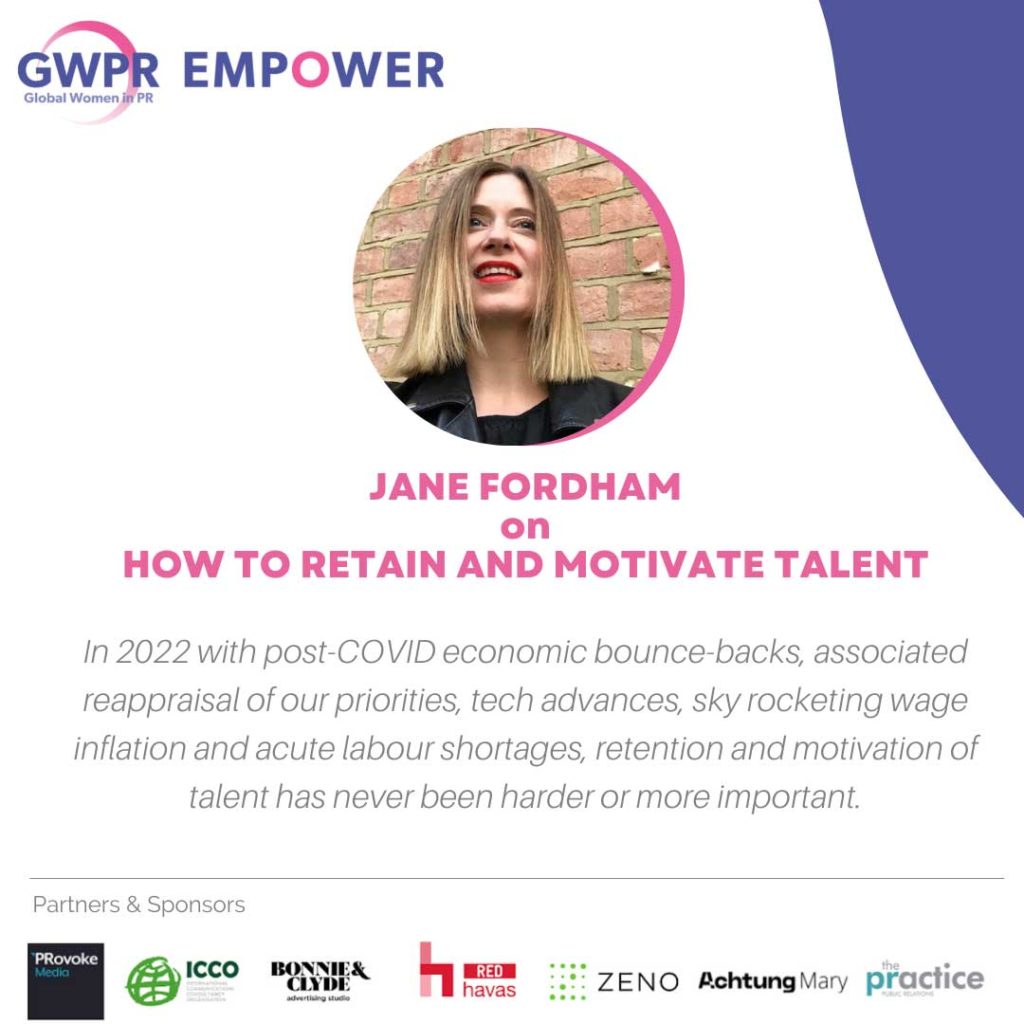Published 22nd Aug 2022
Summary of the session by Isabelle Demaude, Director International Communications, The Hoffman Agency and GWPR Empower programme mentee. Jane Fordham is Partner, Board Member and Head of People at Hanbury Strategy and Founder of Jane Fordham Consulting

It’s the usual round robin as we introduce ourselves ahead of the session. Or is it? Before we dive in, Jane asks a simple, seemingly innocuous question – Why are you here today? What’s your goal?
Now over the course of four sessions, I’d argue us mentees had gotten pretty good at delivering our career footnotes. But lo and behold, one new question asked with warmth and empathy saw the group peeling away layers to reveal confessions from the less-than-rosy side of PR – the war for talent.
In a way, I immediately felt closer to the group – a sense of camaraderie in the knowledge that across all geographies and titles, every single one of us was struggling in some way to find, hire and/or retain good talent. Elusive unicorns, where have you gone I hear the (virtual) room sigh.
And stop. Before we spiral, Jane is quick to point out – talent retention is all relative – you have to benchmark yourself against the current market climate, and not the dream scenario. She also reminds us that while developing and refining a talent strategy won’t happen overnight, talent is out there if you approach it in the right way.
Jane tells us a story of life at a previous agency, where she was assigned the double-hat role of talent and marketing shortly after coming back from her first maternity leave. She worked on developing the agency’s family-friendly policies and gets the word out. In a happy, but accidental turn of events, suddenly an influx of young graduates started writing in – inspired by the company’s commitment to its employees and work-life balance.
She boils this success down to a robust Employee Value Proposition (EVP) – or, in plain speak, the total value an employer can offer employees/candidates in return for their work.
Not to be confused with Employer Branding, which is how you would communicate your EVP, and not to be limited to tangible rewards, such as compensation and benefits. A great EVP distills the essence of a company’s culture, the impact of its work and the environment that’s been created. It’s a vibe – but to be an effective tool in recruiting (and indeed, retention), it needs to be intentional.
Now for the recruitment whistle stop tour. Jane broke pipelining down into seven easy steps:
1) Know where your talent is before you need it – meeting people, regardless of whether you’re looking or not, will never be a waste of time.
2) Encourage the talent to come to you – when advertising for open positions, your content should read as an advert. Not a job description. Not some corporate spiel.
3) But go after the talent too – by which, we mean it’s time to get your LinkedIn (or equivalent) game on. And that quickly leads to…
4) The power of you… – don’t leave it all to HR to sort. If you see good talent you want to work with, then ping them.
5) …And the people that know you best – according to one study, 88% of employers believe employee referrals are the #1 source for ‘above average candidates’. Just watch out for hiring too many people cut from the same cloth.
6) Look for reasons candidates could be right – don’t discount people purely based on job title or gaps in employment. Sure, question it, but that shouldn’t lead to immediate dismissal. And if you really like someone, don’t wait around for a minimum number of ‘good CVs’ to come through before making a decision. Let’s face it, talent is getting snapped up like hotcakes.
7) Interviews are about assessing ‘offer readiness’ – interviewing should be a two or three stage process where you first assess attitude, followed by skillset. Why not introduce a task in between stages to really get a sense? Interviewing should also be a two-way dialogue – make sure the candidate has also been given ample opportunities to ask their own questions.
Alas, 90 minutes was up in a flash for a topic we could spend days discussing. But if I could leave you with one final takeaway – in the words of author Peter Drucker, ‘Culture eats strategy for breakfast’. Throw all the money you want at the situation, but unless you know as an organisation who you are at the core and why that makes you special, why wouldn’t talent begin to flirt with the competition?
Join the book club?
- Powerful – Building a Culture of Freedom and Responsibility (the Netflix story)
- Super Engaged






